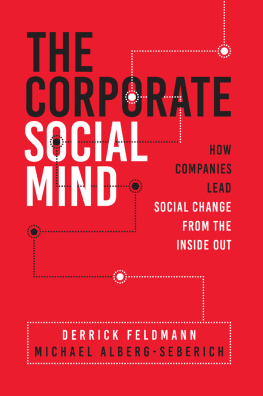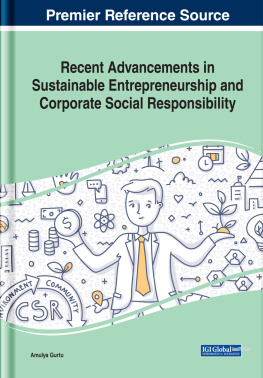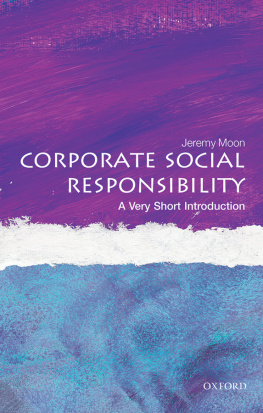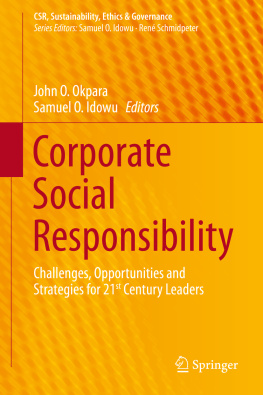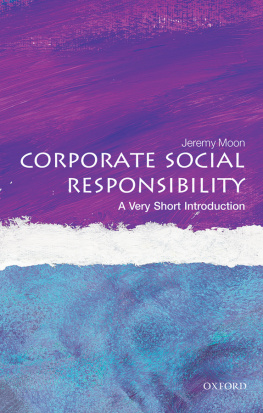CORPORATE SOCIAL INVOLVEMENT
Corporate Social Involvement
Social, political and environmental issues in Britain and Italy
MICHAEL MARINETTO
First published 1998 by Ashgate Publishing
Reissued 2018 by Routledge
2 Park Square, Milton Park, Abingdon, Oxon OX14 4RN
711 Third Avenue, New York, NY 10017, USA
Routledge is an imprint of the Taylor & Francis Group, an informa business
Copyright Michael Marinetto 1998
All rights reserved. No part of this book may be reprinted or reproduced or utilised in any form or by any electronic, mechanical, or other means, now known or hereafter invented, including photocopying and recording, or in any information storage or retrieval system, without permission in writing from the publishers.
Notice:
Product or corporate names may be trademarks or registered trademarks, and are used only for identification and explanation without intent to infringe.
Publishers Note
The publisher has gone to great lengths to ensure the quality of this reprint but points out that some imperfections in the original copies may be apparent.
Disclaimer
The publisher has made every effort to trace copyright holders and welcomes correspondence from those they have been unable to contact.
A Library of Congress record exists under LC control number: 98072804
ISBN 13: 978-1-138-61169-6 (hbk)
ISBN 13: 978-0-429-46357-0 (ebk)
Dedicated to the memory of my father-in-law and dear friend, Harry Hughes
I would like to record my gratitude to the many people who helped me during this study, which originally formed part of my doctoral research undertaken at the University of Westminster between 199295 in the School of Economic and Business Studies. First of all, I would like to mention my supervisor, Robin Theobald, who was of great assistance during the course of this research. Robin carefully guided the research work and offered me a great deal of sound advice during the drafting stage. I should also like to mention my second supervisor, John Stanworth, who commented perceptively on draft chapters and also kindly provided me with some of the research money at his disposal for my study trips to Italy. I would also like to thank Nick Zafiris, Head of the School of Economic and Business Studies, for offering financial assistance for my travelling expenses to Italy. I am indebted to the Norman Hart Educational Foundation which kindly contributed to my travelling expenses for my first research trip to Italy.
This research would not have been possible without the many individuals in companies and organisations that gave up their time to be interviewed about their work. I am particularly grateful to those company representatives from British Telecom, Shell UK, Unilever, BAT Industries and their various subsidiaries. I would also like to thank representatives from the following organisations who agreed to be interviewed: the Policy Studies Institute, Business in the Community, Lambeth City Challenge, LENTA (London Enterprise Agency), Association for Business Sponsorship of the Arts, Action Resource Centre, Charities Aid Foundation, Brixton Enterprise Centre.
There are numerous people who were integral to the Italian phase of my research. Bryn Jones at the University of Bath provided me some very useful contacts. In Italy, I was assisted by Professor Mirella Giannini at the University of Bari, who led me to some useful people. Dr Maurizio Brioni from Reggio Emilia went beyond the call of duty in helping me with the cooperative movement in Italy. Giuseppe della Rocca of Main Management and Beatrice Lentati were also invaluable. I would like to extend a special thanks to all those representatives from Fiat, Olivetti, ENI and their subsidiaries who agreed to be interviewed and for tolerating my clumsy Italian; as well as those that I interviewed from the following banks and small companies: Banca di Roma, Banca Popolare di Milano, Angelini Pharmaceuticals, Cassa di Risparmio di Firenze, Cariplo, Fratelli Dioguardi, Istituto Bancario San Paolo di Torino. My gratitude also extends to those representatives from the Associazione Mecenati Italiani, BIC Liguria, BIC Trieste, Comitato (Comitato per lo Sviluppo di Nuova Imprenditorialita Giovanile), Fondazione Adriano Olivetti, Fondazione Giovanni Agnelli.
I am also indebted to all at Ashgate, especially Sarah Markham and Ann Newell. Without their assistance this book would never have seen the light of day. My final word of thanks and most significant acknowledgement goes to Debbie who was a constant source of encouragement. Any mistakes are of course my own. The credit for any achievement is shared.
This text examines the issue of corporate social responsibility (defined here as business engagement in social action concerned with the general well-being of society). This study initially focuses on Britain. In recent years, there has been growing interest in businesses rendering themselves more socially active and involved in addressing social problems. A number of British companies has adopted the community practices characteristic of corporate life in America since the early 1960s. The first part of the analysis focuses on Britain, but the second part of the text examines whether similar developments have occurred in Italy.
The study employs a variety of sources: historical texts, secondary studies and detailed case studies of the social programmes organised by different corporations (Shell, BT, Unilever, and BAT Industries in Britain, and Fiat, Olivetti, ENI, IRI and Dioguardi in Italy). These case studies are based on in-depth interviews of relevant personnel and on the study of company documents.
The aim is to provide a qualitative explanation of why companies go beyond their commercial remit to engage in philanthropic action. A socially informed analysis is furnished: this area is located in its historical and political context. Any explanation of contemporary advances in corporate social responsibility needs to stress the role of the modern state in society. In particular, it must emphasise the development of relations between the state and the business community. It is argued that, in Britain, as a response to the political and economic crisis of the 1970s, the links between the business and state sectors became ever closer. This created the institutional opportunities for active business involvement in areas such as environmental protection, small firm development and urban regeneration. Italy has seen less political impetus given to active corporate involvement in society. The most significant achievements have come from within the state sector.
Political and economic events external to the business community are highly significant. These provide the necessary external jolts and opportunities for business involvement in areas which, since in the postwar period, have been colonised by the state. At the same time, company policies are not solely shaped by external events and developments. Company involvement in social activities is also a product of certain internal dynamics: the perceptions and concerns of key actors, and the culture within companies. Managers and directors are undoubtedly influenced by what happens in society but they perceive and actively choose particular responses to external events. This is underlined by the case studies of the social policies organised by companies in Britain and Italy.
As well as explaining the phenomenon of corporate responsibility, this study assesses the actual contribution made by the private sector to the well-being of society. This is an important point to consider. In Britain particularly, corporate social activism has come to be equated as a private solution to public problems. It is shown during the course of the analysis that there are limits to what companies can achieve on a social front. It is concluded that corporate social responsibility must emphasise the need for companies to observe social and legal restrictions in their pursuit of commercial goals.



